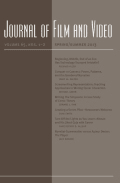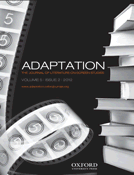
SIGHT AND SOUND
Scope & Guideline
Exploring the Cultural Tapestry of Cinema
Introduction
Aims and Scopes
- Cinematic Analysis and Criticism:
The journal regularly publishes in-depth analyses of films and television shows, offering critical insights into narrative structures, visual aesthetics, and thematic elements. - Cultural Context and History:
Papers often explore the historical and cultural contexts of films, examining how societal changes influence cinematic narratives and representations. - Diversity and Representation:
A key focus is placed on the representation of marginalized groups in cinema, addressing issues of race, gender, and sexuality within film and television. - Film Theory and Philosophy:
The journal engages with various theoretical frameworks and philosophical inquiries related to film, including auteur theory, genre studies, and the impact of technology on filmmaking. - Industry Insights:
Contributions frequently include discussions about the film industry, including production practices, distribution, and the evolving landscape of film criticism in the digital age.
Trending and Emerging
- Exploration of New Media and Formats:
There is an increasing interest in how new media platforms, including streaming services and virtual reality, are reshaping cinematic experiences and audience engagement. - Intersectionality in Film Studies:
Papers are increasingly focusing on intersectional analyses that consider how various identities interact within cinematic narratives, enhancing discussions around representation. - Impact of Global Events on Cinema:
The journal is seeing a rise in articles that analyze how global events, such as the COVID-19 pandemic and social movements, influence film production and thematic content. - Emerging Filmmakers and Voices:
A trend towards highlighting the works of emerging filmmakers from diverse backgrounds is evident, reflecting a commitment to amplifying underrepresented voices in the industry. - Environmental and Social Justice Themes:
There is a growing body of work addressing environmental issues and social justice narratives within film, indicating a shift towards films that engage with contemporary global challenges.
Declining or Waning
- Traditional Film Criticism:
There appears to be a noticeable decline in conventional film reviews in favor of more analytical and thematic explorations of films, indicating a shift towards deeper critical engagement. - Mainstream Hollywood Focus:
Articles centered on mainstream Hollywood productions have become less frequent, as the journal increasingly emphasizes independent and international cinema. - Nostalgic Retrospectives:
Papers that primarily focus on nostalgic retrospectives of classic films are waning, as contemporary issues and current cinematic trends take precedence in scholarly discussions.
Similar Journals

Hrvatski Filmski Ljetopis
Illuminating the Art of Filmmaking.Hrvatski Filmski Ljetopis, published by the Croatian Film Clubs Association, serves as a pivotal academic journal in the field of film studies, celebrating and analyzing the rich cinematic heritage of Croatia and beyond. With an ISSN of 1330-7665, this journal caters to researchers, practitioners, and students who are passionate about the art of filmmaking, encompassing both theoretical discourse and practical implications. Although it is not currently available as an open-access publication, its curated content is of significant value to anyone interested in the evolution, critique, and history of film in a Croatian context, having previously been indexed in Scopus until coverage was discontinued. The journal operates out of Zagreb, Croatia, at the Croatian Film Clubs Association headquarters, and aims to foster scholarly dialogue while contributing to the broader field of national and international cinematography.

JOURNAL OF FILM AND VIDEO
Unveiling New Perspectives in Film and VideoThe JOURNAL OF FILM AND VIDEO, published by University of Illinois Press, is a pivotal academic platform that delves into the intricate intersections of film, video, and media studies. With a notable ISSN of 0742-4671 and E-ISSN 1934-6018, this journal has established itself as a significant contributor to the visual arts and performing arts field, currently positioned in Q3 of its category as per the 2023 quartiles. Spanning from 2002 to 2024, it presents a comprehensive array of research, critiques, and theoretical discussions that advance scholarly discourse in film and video. The journal encourages contributions that explore innovative narratives and methodologies, catering to a diverse readership of researchers, professionals, and students alike. While it maintains a traditional subscription model and is not open access, its impact is amplified through its Scopus ranking, holding the 323rd position out of 667 in the visual arts and performing arts category. With its commitment to fostering critical conversations and promoting scholarly excellence, the JOURNAL OF FILM AND VIDEO remains an essential resource for those invested in the study and understanding of film and media.

FILM CRITICISM
Bridging Theory and Critique in Film StudiesFILM CRITICISM is a prestigious open-access journal dedicated to the study and review of cinema, offering a platform for scholars, critics, and students to engage deeply with the evolving landscape of film. Published by Film Criticism and based in the United States at Allegheny College, this journal has been contributing to film studies since 2002, with recent issues spanning from 2023 to 2024. Registered under ISSN 0163-5069, it is recognized in the Visual Arts and Performing Arts categories, achieving a commendable rank of #372 out of 667 in Scopus, placing it in the 44th percentile of its field. With an open-access policy implemented since 2016, FILM CRITICISM not only broadens accessibility to scholarly work but also enhances the dialogue around cinematic narratives, theories, and critiques. The journal's relevance is underscored by its current Q3 ranking, making it an essential resource for researchers and professionals alike who are invested in the critical examination of film.

CINEFORUM
Cultivating a Passion for Cinematic and Performative TextsCINEFORUM is a distinguished journal published by the FEDERAZIONE ITALIANA CINEFORUM, focusing on the vibrant field of Visual Arts and Performing Arts. With an ISSN of 0009-7039, this journal serves as a significant platform for researchers and practitioners interested in critical discussions and analyses pertaining to cinema and performance. Although coverage in Scopus discontinued in 2020, CINEFORUM has established its standing with a category ranking in the Q4 quartile for Visual Arts, reflecting its niche yet passionate readership in the arts community. Based in Bergamo, Italy, the journal aims to foster a deeper understanding of cinematic and performative texts, offering insights and scholarly contributions that enhance the discourse within these artistic domains. Catering to an audience that includes researchers, professionals, and students, CINEFORUM remains an essential resource for those looking to explore the intersection of theory and practice in cinema and performing arts.

Transnational Screens
Bridging Cultures Through the Lens of Contemporary MediaTransnational Screens is a premier academic journal published by Taylor & Francis Ltd, focusing on the dynamic intersections of visual arts, performing arts, and communication in a globalized context. Since its inception, the journal has garnered significant recognition, featuring in the Q1 category for Visual Arts and Performing Arts and Q3 for Communication as of 2023, reflecting its influential contributions to these fields. With a Scopus ranking placing it in the 78th percentile in Visual Arts and Performing Arts, this journal serves as a vital platform for researchers, professionals, and students aiming to explore the implications of transnational narratives in contemporary media and artistic practices. The journal is accessible to a diverse readership and promotes open dialogue through its commitment to publishing innovative and interdisciplinary research from 2020 to 2024. As a key resource for understanding the complexities of transnational screens, it invites submissions that push the boundaries of traditional scholarship and engage with pressing global issues through the lens of the visual and performing arts.

Atalante-Revista de Estudios Cinematograficos
Illuminating the Art of Cinema with Critical Insight.Atalante-Revista de Estudios Cinematograficos, an esteemed open-access journal published by ASOC CINEFORUM L ATALANTE, has been a vital platform for scholarly discourse in the fields of Cultural Studies, History, and Visual Arts and Performing Arts since its inception in 2011. With a commitment to promoting innovative research and critical analyses, Atalante has earned a commendable reputation, achieving Q2 status in Cultural Studies and both Q1 rankings in History and Visual Arts for 2023. Based in Valencia, Spain, this journal not only serves as a conduit for scholars to disseminate findings but also provides unrestricted access to its contents since 2013, fostering a more informed and engaged academic community. With its diverse range of topics and the ability to access high-quality research at no cost, Atalante plays a crucial role in advancing the understanding of cinematic studies and its contextual significance in broader cultural narratives.

FILM QUARTERLY
Pioneering Research in Visual and Performing ArtsFilm Quarterly, published by University of California Press, stands as a leading academic journal in the field of visual arts and performing arts, boasting a prestigious Q1 ranking in the 2023 category quartiles. Since its inception in 1969, this quarterly publication has made significant contributions to the study and critique of cinema, attracting attention for its insightful articles, cutting-edge research, and comprehensive reviews that appeal to scholars, practitioners, and students alike. With an ISSN of 0015-1386 and an E-ISSN of 1533-8630, it serves as an essential resource for those seeking to enhance their understanding of film theory, history, and analysis. Although not open access, its articles are critical for researchers navigating the complex landscape of contemporary and historical film studies, underscoring its vital role in advancing scholarship within the discipline.

Studi Pasoliniani-Rivista Internazionale
Decoding Pasolini: A Journey Through Language and TheoryStudi Pasoliniani-Rivista Internazionale is a distinguished academic journal dedicated to the exploration of the works and influence of Pier Paolo Pasolini, an eminent figure in Italian literature and cinema. Published by Fabrizio Serra Editore in Italy, this journal adheres to a multidisciplinary approach that encompasses critical analyses in linguistics, literature, and literary theory, making it a valuable resource for researchers and scholars seeking to deepen their understanding of Pasolini's legacy. Currently, Studi Pasoliniani holds a Q4 quartile ranking in both Linguistics and Language and Literature and Literary Theory, reflecting its commitment to fostering scholarly discourse within these fields. Although the journal does not operate under an open access model, its publication from 2019 to 2023 assures that its content remains relevant and beneficial for academic inquiry. Researchers, professionals, and students alike will find this journal an indispensable venue for engaging with contemporary interpretations and critiques of Pasolini's oeuvre, amidst the rich cultural and historical contexts that inform his work.

Adaptation-The Journal of Literature on Screen Studies
Transforming Texts into Visual Narratives.Adaptation: The Journal of Literature on Screen Studies, published by Oxford University Press, stands at the forefront of interdisciplinary scholarship, blending the realms of literature, visual arts, and performing arts. This esteemed journal addresses the evolving relationship between literature and its adaptation into various screen formats, providing a vital platform for researchers, professionals, and students interested in the adaptation process across different media. With a commendable 2023 impact factor reflected by its recognition in the Q1 quartile categories for Literature and Literary Theory as well as Visual Arts and Performing Arts, it ranks in the top tiers of its field, showcasing its influence and reach. The journal is dedicated to exploring theoretical and practical approaches to adaptation, ensuring that voices from diverse perspectives are heard. Although it operates under traditional access models, the insights offered in its publications are invaluable for those looking to deepen their understanding of how literature translates into screen narratives. With coverage spanning from 2010 to 2024, Adaptation continues to be a pivotal reference point for innovative scholarship and critical discourse.

Film History
Navigating the evolution of cinema through a historical lens.Film History, published by Indiana University Press, is a premier academic journal that delves into the evolving landscape of cinema, illuminating the intricate interplay between historical narratives and film culture. With ISSN 0892-2160, and E-ISSN 1553-3905, this journal has established itself as a crucial resource for researchers, professionals, and students in the fields of history and visual arts. Recognized in the Q2 category for both History and Visual Arts and Performing Arts as of 2023, it boasts impressive Scopus rankings, securing #152 out of 667 in Visual Arts and Performing Arts, and #524 out of 1760 in History, placing it in the top 30th percentile. Although it does not currently offer open access options, the journal provides a wealth of scholarly articles that critically engage with film as a historical text, fostering a deeper understanding of its role in shaping societal narratives. Since its inception in 1987, Film History has been at the forefront of academic discourse, making it an invaluable resource for those seeking to explore the rich tapestry of cinematic history.